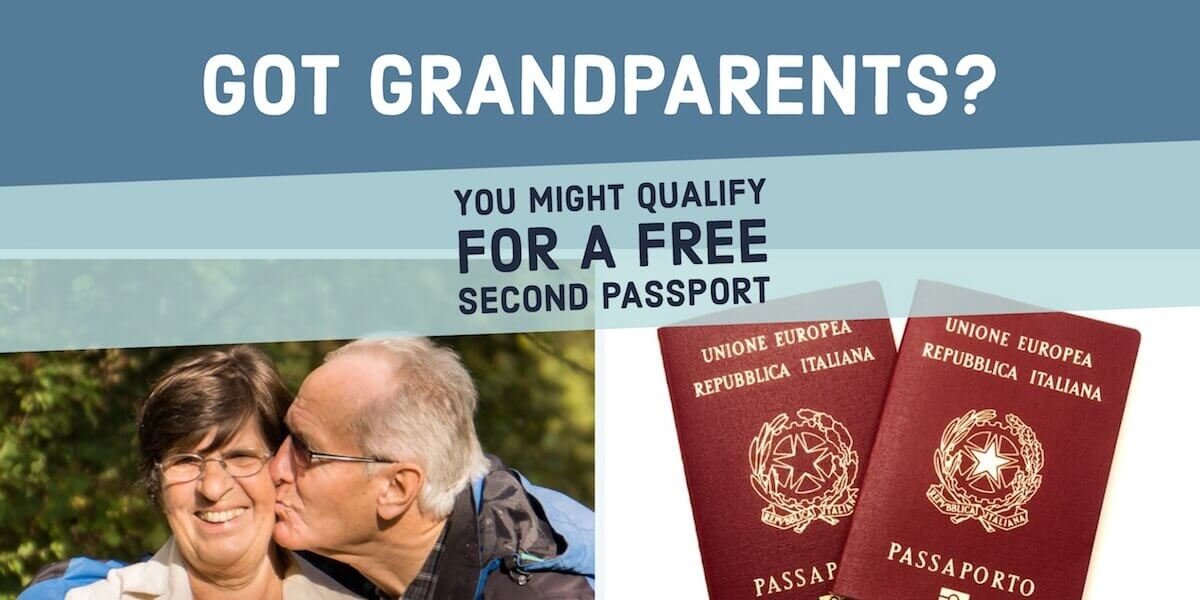Citizenship By Descent
Learn how you can get a valuable
Second Passport & Citizenship By Descent...
-
AUTHOR
James Hickman -
LAST UPDATED
February 9, 2023
If you’ve got parents, grandparents (and in some cases even great-grandparents) from Italy, Ireland, or several other European countries, you may be part of what I call ‘the lucky bloodline club’.
In this article, you’ll learn how to take advantage of this and how to get citizenship by descent as well as a valuable second passport through your ancestry.In this In-Depth Article...
Citizenship By Descent is just ONE of FOUR ways to obtain a Second Passport & Citizenship…
Not everyone is lucky enough to qualify for citizenship by ancestry, but fortunately, there are options that allow anyone to get a second passport (without paying hundreds of thousands of Dollars for it…).
Download our free Easiest Citizenship & Passport Comparison Sheet and see all the options you have at a glance.
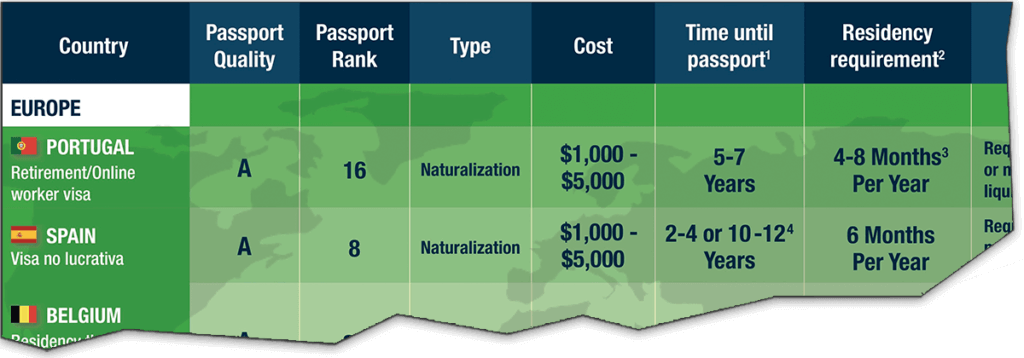
Inside you’ll find…
Being part of the lucky bloodline club is a very big deal. There are countless numbers of people who spend upwards of $2 million to buy a second citizenship. Others uproot their families and move abroad for up to 7 years to get citizenship through naturalization.
They do this because they realize the incredible value of dual citizenship. After all — a second passport gives you the lifelong benefit of more options to live, work, invest, travel, and do business around the world. That makes a second passport one of the best investments you can ever make. And these benefits don’t just apply to you. Future generations of your family who won’t be born for decades will receive the same benefits of dual citizenship because of the investment you made today.Citizenship by descent is a form of birthright citizenship. It means that if you have ancestors (such as parents, grandparents, or even great-grandparents) from a country, you may be eligible to become a citizen of that country yourself.
This right is often referred to as jus sanguinis (Latin for “blood rights” or “law of the bloodline”).
This applies to Americans too. Even if you were born in the US and hold only American citizenship, you may be eligible for foreign citizenship by ancestry, depending on where your ancestors hailed from. This includes the right to dual citizenship and a second passport, which can give you more freedom than your current passport allows.
Citizenship through ancestry is particularly common in Europe, which means it is one of the easiest ways to acquire European citizenship and a European second passport.
European citizenship gives you the right to live, work and do business in all 28 European Union countries — like France, Spain, Germany, and Sweden.
There are a lot of benefits to acquiring citizenship in Europe. For example, if you’re not finding the right employment opportunities at home, you can broaden your search to European countries. And if you have children, they would get access to the European educational system, which is mostly free.
A second passport & dual citizenship also ensures that, no matter what happens next in your country, you always have another place to go, to live, work, do business, retire, and in some cases, even seek refuge.
That way, when things go bad, you can take yourself and your family out of harm’s way.
If you’re a US citizen, that’s likely why your ancestors first came to America.
And there may come a time when you decide that going back to the country of your ancestors is in your family’s best interest.
Ultimately, a second passport is all about giving you more options. And the more options you have, the more freedom you will experience.
Here are the steps to get a second passport & citizenship through your ancestry:
Obtaining citizenship through ancestry is usually straightforward.
However, it can be difficult at times, depending on the country and its bureaucratic procedures.
For most countries, the application process is simple enough that you can do it yourself.
But you may still want to consider hiring a professional immigration lawyer or professional genealogist to help you with the research and application.
If you believe that you have foreign ancestry, you should begin the following process to see if you qualify for citizenship through your bloodline.
Here are the steps to get a second passport & citizenship through your ancestry:
First, begin by talking to some of your relatives, and let them guide you through your family history.
You should try to find out where your grandparents have emigrated from, and whether they still hold – or have claims to – citizenship from their home countries.
Then, you should visit the consular website of the country you think you might be eligible to acquire citizenship from. Look for answers to the questions:
Some countries will allow you to claim citizenship if your parents are from there. And others allow you to claim citizenship through your grandparents, great-grandparents, or even further.
You’ll find a list of popular countries that offer citizenship through ancestry and their requirements further down in the article.
Requirements for eligibility vary from country to country, but you will usually have to demonstrate an uninterrupted lineage between you and your ancestors.
Most often, “uninterrupted” means that no ancestor renounced or lost their citizenship before passing it on to the next descendant in your lineage.
For example, if your grandfather moved from Italy to the US and naturalized as a US citizen, he would have given up his Italian citizenship.
But if your father was born before your grandfather got his US citizenship, your grandfather would have passed on his Italian citizenship by descent to your father before he lost it. The lineage would not be broken.
Once you’ve determined that you are entitled to citizenship, start going through the list of requirements and gathering all the documentation you need to prove that you are eligible to claim citizenship through ancestry.
This usually will include your birth certificate and those of your ancestors, related marriage, divorce, and naturalization certificates (if applicable), as well as your current passport.
These documents usually need to be apostilled and translated into the country’s local language.
Most countries also require you to make an appointment at the local consulate to review and verify your application in person.
If everything goes well, you’ll have your new second passport shortly after…
Pro Tip:
Embassies tend to be overwhelmed with requests for appointments like these, and it can take months or even years until they can see you. Therefore it’s usually best to make an appointment as soon as possible and continue collecting your documentation while you wait for it.
Although getting a second passport & citizenship through your ancestry is by far the easiest, cheapest and quickest option, it’s NOT the only one.
If it turns out you are not eligible or if your application is declined, don’t lose hope. There are other options…
In fact, there are four ways to obtain a second passport & citizenship and one of them is very low cost and available to EVERYONE.
I encourage you to learn more about that option inside our free report The Four Passports ANYONE Can Obtain (Including a European One)
Inside you’ll also learn…
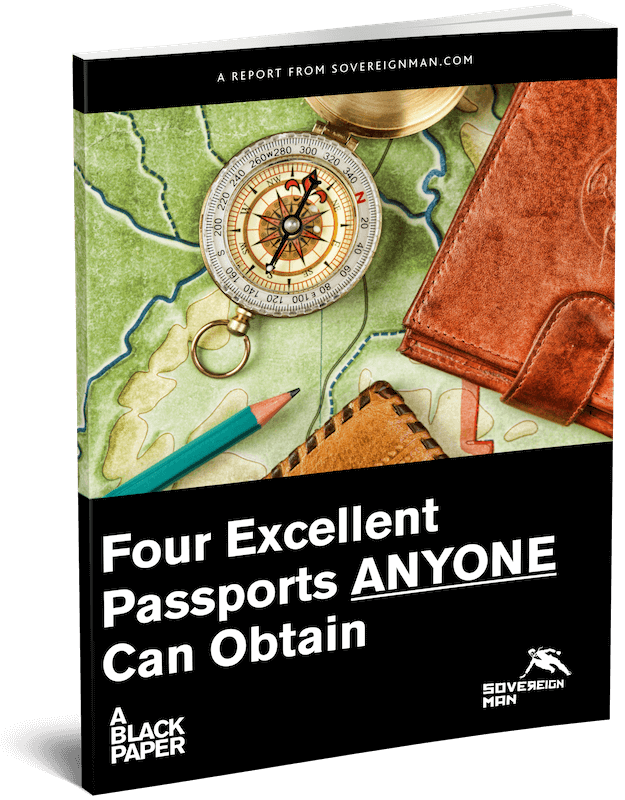
If you are already a member of Sovereign Confidential, you also have access to in-depth intelligence reports on each of these countries.
German-Americans represent 17% of the total US population and are the largest ethnic group in America.
In the Sovereign Man Passport Ranking, the German passport ranks as the 6th best in the world and gives holders visa-free access to 162 countries, including all of Europe, the US, Canada, and the UK.
Unfortunately, German citizenship law is strict. Germany’s immigration authorities are not interested in any ancestors beyond your parents. Therefore, claiming citizenship through your German grandparents is not an option.
However, you can still claim your German citizenship through ancestry if:
Want More On German Citizenship By Descent?
Download our free intelligence report on How To Get a German Passport & Citizenship By Descent to learn more.
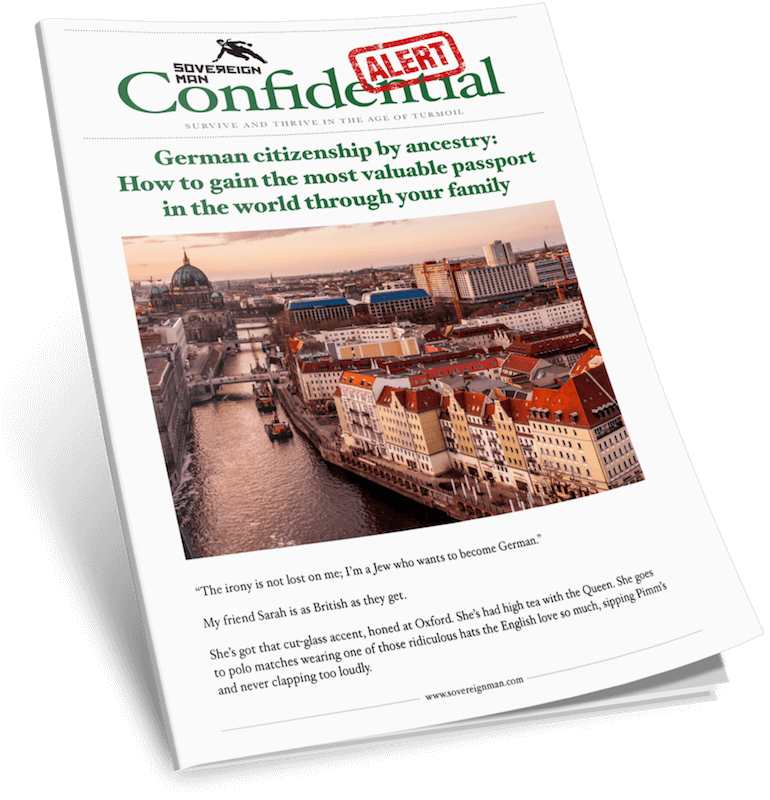
Gaining Italian citizenship through descent is straightforward. You can go as far back as a grandparent or even a great-grandparent to claim citizenship through your bloodline.
Italian citizenship law is built upon the idea of ‘uninterrupted lineage’. This means that no ancestor at any time renounced their Italian citizenship before passing their citizenship to their children.
For example, if your grandfather immigrated to the US and naturalized as a US citizen, he would have renounced his Italian citizenship. However, if your father was born before your grandfather gained US citizenship, then your father would have inherited Italian citizenship by descent. The lineage would still be intact.
There are some exceptions and challenges you will have to consider..
One of them is “The Rule of 1948”, which states that women cannot pass citizenship to children born before January 1st, 1948. In other words, if your grandmother was born in 1922 and your father was born in 1942, you would not be eligible for citizenship.
If you think this rule makes it impossible for you to obtain citizenship through ancestry, here is the good news:
In 2009, the Italian Supreme Court overturned the ruling. But the Italian government is slow and the ruling from 2009 has still not been made law.
If your application to become an Italian citizen is affected by this rule, it will initially be rejected. But you can take this rejection to court and get it appealed.
Pro Tip:
One little-known benefit of having Italian citizenship is that you can very quickly and easily get permanent residency in Panama using the “The Mutual Friendship, Commerce and Navigation Treaty.”
And Panama residency is an excellent option because of its territorial tax system.For more in-depth information, read our Guide to Getting Citizenship By Descent in Italy
Ireland has one of the most straightforward processes for obtaining citizenship by descent. That’s because Ireland allows you to trace your Irish ancestry back to your grandparents and, in certain cases even great-grandparents.
On top of that, if either of your parents was an Irish citizen at the time of your birth, then you are also an Irish citizen.
And if you have a grandparent born in Ireland, you are also entitled to an Irish passport, even if you and your parents were born outside of Ireland.
If that is the case for you, you can start by registering yourself in the Foreign Birth Register and then applying for citizenship.
It gets a little more complicated if you need to go through a great-grandparent. In that case, you are only eligible if one of your parents has registered themselves in the past using the same procedure.
If you were born in or before 1986, your parents must have been registered between 1956 and 1986. And if you were born after 1986, they must have been registered before you were born.
The Irish government’s website has a questionnaire that can help you determine whether you qualify for Irish citizenship by descent and provides more information here.
How do you like this article?
Click one of the stars to add your vote...
Other readers gave this article an average rating of 5 stars.
Just like Italy, Poland’s citizenship laws are built around the idea of “uninterrupted lineage.” That means you have to make sure that no Polish ancestor in your lineage renounced their Polish citizenship at any time.
The good news is that Poland is generous with how far back you can trace your ancestry. If you have a great-grandparent who was born in Poland, then you could claim citizenship through ancestry.
The bad news is that despite the country’s complicated war history, Poland is very strict with respect to documentation. This is true despite the nation’s complicated war history. The burden of proof is on you, and the problem is that many family histories were destroyed by war.
Unfortunately, no matter the circumstances or how tragic the family history, the Polish government will demand proper documentation. Officials see everyone’s war history as more or less equally tragic.
That’s why we generally recommend getting professional help from someone who’s very familiar with Poland’s citizenship by descent procedures, such as a law firm or professional genealogist.
(We can only give recommendations on trusted and vetted contacts to our premium members as publishing that information online would overwhelm our contacts.)
Lithuanian law allows you to trace your ancestry back three generations.
The first thing you’ll need to do is determine when exactly your ancestor(s) left Lithuania.
If at least one of your parents, grandparents, or great-grandparents were Lithuanian citizens and left Lithuania during or after World War II, then you are likely eligible for dual Lithuanian citizenship.
That means that you can get Lithuanian citizenship and passport while keeping your current citizenship.
If at least one of your parents, grandparents, or great grandparents were Lithuanian citizens before World War II but emigrated from Lithuania before 1940, then you can still get Lithuanian citizenship… but you’d have to renounce your current citizenship to swear sole allegiance to Lithuania.
And if your ancestors left Lithuania before 1918, then you will likely not be eligible for citizenship in Lithuania (you might, however, be eligible for citizenship in Latvia).
No matter which ancestor you choose for this process, you must prove that you are related to each person in the chain. This could include a parent, grandparent, and great-grandparent.
For example, if your great-grandparent was a Lithuanian citizen, but you cannot find the necessary documents for your grandfather’s citizenship status, the application will be incomplete.
Like most countries once under Soviet control, getting all the right documents can be tricky. That’s why we recommend you hire the services of a specialized lawyer and consult a professional genealogical services firm.
Latvia allows you to trace your ancestry all the way back to your great-grandparents.
There are two main options for obtaining Latvian citizenship by descent.
First, you can become a citizen through ancestry if one of your parents possesses Latvian citizenship.
Second, you can obtain Latvian citizenship from a grandparent or great-grandparent. There are two routes you can take. Both depend upon when your ancestor held Latvian citizenship.
If your ancestor left Latvia because of Soviet or Nazi occupation, there is a straightforward approach to obtaining citizenship through your bloodline.
You will need to show proof that your ancestor or ancestors left Latvia as a result of the occupation. And, you will need documentation that proves that your ancestors were citizens of Latvia on June 17, 1940.
The other route is more challenging and requires that your ancestor or ancestors are of Latvian origin and lived in Latvia at some point between 1881 and 1940.
This route widens the timeframe, but it also adds a major requirement: you need to show that you can communicate and understand the Latvian language.
The process of applying for Armenian citizenship through ancestry is straightforward. Armenian law allows you to trace your ancestry back to your grandparents.
Armenian law clearly states that an individual with at least one parent who holds Armenian citizenship can claim citizenship through ancestry.
If you have an Armenian grandparent, the process is a bit more difficult, but still possible.
For you to claim citizenship through a grandparent, one of your parents needs to go through the process first. Once a parent obtains Armenian citizenship, then you will be able to go through the process yourself and claim citizenship through your parent.
Romania is a shining example of what can be achieved if governments get out of their own way. Boasting a dynamic economy, a solid passport (B+ Grade), a low cost of living, and epic scenery, Romania packs a punch as a Plan B destination.
Romania’s Citizenship By Ancestry program offers applicants of Romanian descent the ability to become Romanian citizens up to two generations back.
As with most ancestry programs, the requirements and nuances can be quite daunting for the uninitiated. Hence, it may be advisable to work with a legal professional on the ground in order to ensure your application goes smoothly.
Regardless, you’ll need to travel to Romania in person for the submission process, as the authorities there will need to “identify” you before accepting your case. And citizenship by ancestry applications takes time.
For more in-depth information read our Guide to Getting Citizenship By Descent in Romania
If you have Serbian ancestors, you could be eligible to become a citizen and obtain the country’s passport. And given that this passport earns a solid B+ Grade, even though it’s not part of the Schengen Area, it’s certainly nothing to be sneezed at.
Combine that with a low cost of living, a dynamic economy, and all the amenities you could ask for, and Serbia starts making a lot of sense as a Plan B destination.
Article 18 of Serbia’s citizenship law allows you to claim citizenship if you descend from a Serbian citizen directly, even if your ancestor left the country decades ago. Your Serbian ancestor must have left Serbia permanently, and settled abroad (e.g. in the United States or Canada).
Our vetted legal contract in Belgrade reports that there is no limit on the number of generations you can go back, as long as you can prove that you are connected to your Serbian ancestor by blood and that you are a direct descendant of theirs.
You can find out more about the additional requirements and eligibility scenarios in this overview of the Serbian Citizenship By Ancestry program.
As a Plan B destination, Portugal requires little introduction. Boasting an affordable cost of living, a safe, relaxed lifestyle, and one of the best climates on the planet, the country has attracted tens of thousands of foreigners to its shores in the past decade.
The country’s appeal has been buoyed by the Golden Visa and D7 Visa residency programs… But for those with the right bloodline, a shortcut to a Portuguese passport exists – in the form of the country’s Citizenship By Ancestry program.
Portugal allows you to apply for their citizenship and passport up to two generations back, i.e. if your grandparents were Portuguese citizens. You can claim Portuguese citizenship if one of your parents or grandparents is/was Portuguese (and did not lose their nationality during their lifetime).
But having a Portuguese grandma or grandpa alone is not sufficient. You will still have to show that you have “effective ties to the national community”, including:
Out of three, you will probably only have to worry about the language requirement.
And if you’ve got Jewish roots…
To compensate for the persecution of Jews in the country 500 years ago, Portugal today allows Sephardic Jews to qualify for Portuguese citizenship. So if you’re of Jewish descent, why not capitalize on it as part of your European Plan B?
Check out our complete guide and Learn more about Portugal’s Citizenship By Descent Program
Were any of your parents, grandparents, or earlier ancestors from Greece? If so, you’re in luck – the Greek Citizenship By Ancestry program offers you a path to obtaining Greek citizenship and a Greek passport.
Greece’s Citizenship By Ancestry program gives you the option to become a Greek citizen even if your immediate parents are not Greek citizens:
Option 1: If your deceased grandparent was a Greek passport holder, but your parents aren’t, they can also apply for Greek citizenship first, which in turn would qualify you under this route. This does mean additional hassle, time, and administrative work though.
If your parents are both deceased, you can skip a generation and claim your grandparents’ nationality directly.
And once you’ve naturalized, your children can claim their Greek citizenship too.
Option 2: Even if neither of your parents are Greek passport holders, but your late grandfather or even great-grandfather was a citizen, you can still become a Greek citizen yourself by applying for naturalization based on your Greek origin.
And as an added bonus, there’s no limit on the generations you can go back in order to apply for naturalization based on your Greek origin (via Option 2).
For both the above routes, you have to contact your nearest Greek consulate in order to start the application process. The process is lengthy, and took around 24 months to complete, even before the covid pandemic struck.
It is advisable to start following up on your case file’s progress after the initial 12 months have passed, as Greek consulates tend to be bad at admin processes.
Read on to learn more about Greece’s Citizenship By Descent Program
Boasting evergreen tourist attractions like Dubrovnik and Split, Croatia is a scenic country with a lot to offer – including over 1,200 idyllic islands to choose from, making it one of the world’s best sailing destinations. And if you’ve got the ability to obtain citizenship there on the basis of your Croatian ancestry, it also serves as an excellent Plan B destination.
Children become Croatian citizens on the basis of origin if:
Both parents are Croatian nationals when the child is born, OR,
One of the parents is a Croatian citizen, AND the child is born inside Croatia.
If you can’t qualify on the above bases, you may still be able to become a Croatian citizen via the following options:
Article 11 — Descendants of a Croatian Emigrant: To qualify under this track, you must have a Croatian ancestor that was born in Croatia. Technically, there is no limit to the number of generations you can go back to find your Croatian ancestor, but the farther back you go, the more difficult it will be to find the supporting documentation to prove it.
Article 16 — Connection or belonging to the “Croatian people”: Under this option, if your ancestor was “ethnically” Croatian, regardless of their place of birth, you could qualify to apply for Croatian citizenship. And there are multiple ways of proving that your ancestor was ethnically Croatian.
Read on to learn more about Croatia’s Citizenship By Ancestry Program
While the European and EU countries offer significant advantages for those seeking dual citizenship through ancestry, there are a number of other countries around the world that also provide this opportunity. This is far from an exhaustive list but here are some examples:
Australia – At the time of your birth, you are required to have at least one parent who must be an Australian citizen.
Israel – For Israeli citizenship at least one parent must be an Israeli citizen or another option is to apply through the Law of Return.
Mexico – You must have a minimum of one parent who is a Mexican Citizen and born in Mexico to qualify.
United Kingdom – If at the time of your birth at least one parent was a British citizen you can apply to be a citizen of the United Kingdom.
Learn how ANYONE can get a Second Passport & Citizenship
Not everyone is lucky enough to qualify for citizenship by descent, but fortunately, there are options that allow anyone to get a second passport (without paying hundreds of thousands of Dollars for it…).
Download our free Easiest Citizenship & Passport Comparison Sheet and see all the options you have at a glance.
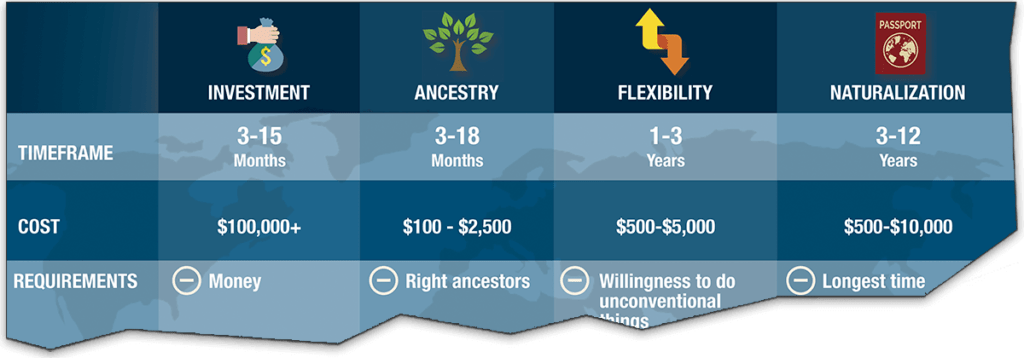
Inside you’ll see all the options you have at a glance and find…
If you don’t have time to read the full article, here are the most frequently asked questions we get…
Although this process requires some patience and research, gaining a second passport can prove invaluable. Gaining citizenship through your bloodline comes with many benefits, and each country on our list offers a range of opportunities for you and your family.
The financial benefits are also important. Your second citizenship has the potential to significantly reduce your tax burden.
US citizens who establish residency abroad can also take advantage of the “Foreign Earned Income Exclusion” provision which allows you to earn over $100,000 per year, tax-free.
And, by obtaining a second passport, you are passing on these opportunities to your children.
This is what it all comes down to increasing your options. A second passport opens up new opportunities for you to travel, live, do business and retire.
Our intelligence reports cover all of the above citizenship by descent options in detail as well as three more ways to get a second passport & citizenship.
Additionally, we also have intelligence on everything from new residency, foreign banking, options to reduce, defer, or even eliminate your taxes, to incredible investment picks outside the mainstream.
Join over 100,000 subscribers who receive our free Notes From the Field newsletter
where you’ll get real boots on the ground intelligence as we travel the world and seek out the best opportunities for our readers.
It’s free, it’s packed with information, and best of all, it’s short… there’s no verbose pontification here– we both have better things to do with our time.
And while I appreciate all the visitors who stop by our website, I provide special bonuses to our email subscribers… including free premium intelligence reports and other valuable content that I only share with them.
It’s definitely worth your while to sign-up, and if you don’t like it, you can unsubscribe at any time.
How did you like this article?
Click one of the stars to add your vote...
Other readers gave this article an average rating of 5 stars.
